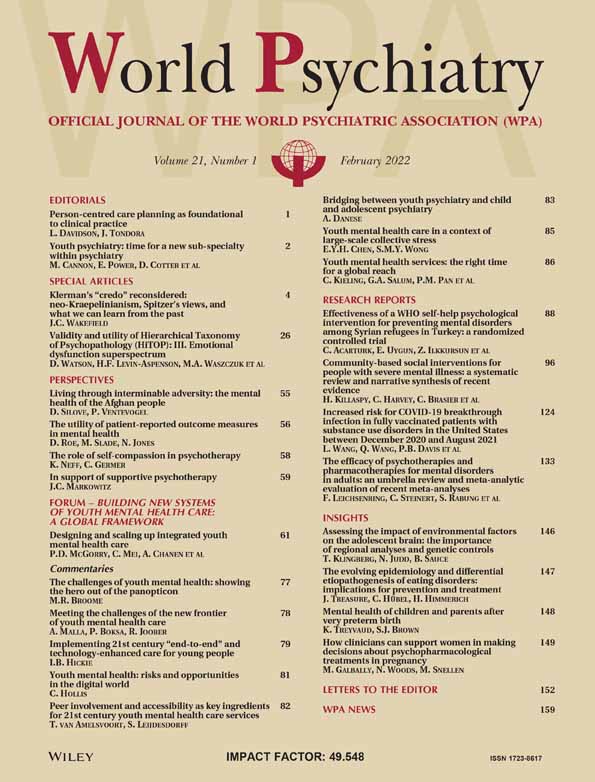创伤后应激障碍:不断演变的概念和证据以及未来的研究方向
IF 65.8
1区 医学
Q1 Medicine
引用次数: 0
摘要
创伤后应激障碍(PTSD)诊断的引入极大地影响了对创伤事件反应的理解。在本文中,我们回顾了这种情况的诊断标准的最初版本和相关的流行病学发现,包括社会文化差异。我们考虑了在多种情况下发生的创伤后反应的证据,这些证据之前没有被定义为创伤,以及这些观察结果对诊断的影响。本文回顾了DSM - 5分离亚型和ICD - 11诊断复杂PTSD的最新进展,进一步证明存在几种不同的PTSD表型。我们描述了创伤后应激障碍的心理基础,包括对记忆和身份的干扰。更广泛地关注身份可能能够适应群体和社区对创伤和创伤后应激障碍经历的影响,以及资源损失的影响。然后我们总结了目前关于创伤后应激障碍的生物学基础的证据,特别关注遗传和神经影像学研究。尽管在预防方面的进展令人失望,但现在有广泛的证据支持各种心理治疗对已建立的创伤后应激障碍的疗效,包括以创伤为重点的干预措施——如以创伤为重点的认知行为治疗(TF - CBT)和眼动脱敏和再处理(EMDR)——和非创伤为重点的治疗,其中还包括一些新兴的基于身份的方法,如以现在为中心和以同情为中心的治疗。此外,还有一些很有前景的干预措施,既不是心理上的,也不是药理学上的,或者是药理学和心理学方法相结合的,比如3,4‐亚甲基二氧甲基苯丙胺(MDMA)‐辅助心理治疗。我们回顾了在资源有限的环境和跨文化背景下调整干预措施的优先领域以及基于社区的方法的进展。最后,我们确定了创伤和心理健康工作的未来方向。本文章由计算机程序翻译,如有差异,请以英文原文为准。
Post‐traumatic stress disorder: evolving conceptualization and evidence, and future research directions
The understanding of responses to traumatic events has been greatly influenced by the introduction of the diagnosis of post‐traumatic stress disorder (PTSD). In this paper we review the initial versions of the diagnostic criteria for this condition and the associated epidemiological findings, including sociocultural differences. We consider evidence for post‐traumatic reactions occurring in multiple contexts not previously defined as traumatic, and the implications that these observations have for the diagnosis. More recent developments such as the DSM‐5 dissociative subtype and the ICD‐11 diagnosis of complex PTSD are reviewed, adding to evidence that there are several distinct PTSD phenotypes. We describe the psychological foundations of PTSD, involving disturbances to memory as well as to identity. A broader focus on identity may be able to accommodate group and communal influences on the experience of trauma and PTSD, as well as the impact of resource loss. We then summarize current evidence concerning the biological foundations of PTSD, with a particular focus on genetic and neuroimaging studies. Whereas progress in prevention has been disappointing, there is now an extensive evidence supporting the efficacy of a variety of psychological treatments for established PTSD, including trauma‐focused interventions – such as trauma‐focused cognitive behavior therapy (TF‐CBT) and eye movement desensitization and reprocessing (EMDR) – and non‐trauma‐focused therapies, which also include some emerging identity‐based approaches such as present‐centered and compassion‐focused therapies. Additionally, there are promising interventions that are neither psychological nor pharmacological, or that combine a pharmacological and a psychological approach, such as 3,4‐methylenedioxymethamphetamine (MDMA)‐assisted psychotherapy. We review advances in the priority areas of adapting interventions in resource‐limited settings and across cultural contexts, and of community‐based approaches. We conclude by identifying future directions for work on trauma and mental health.
求助全文
通过发布文献求助,成功后即可免费获取论文全文。
去求助
来源期刊

World Psychiatry
Nursing-Psychiatric Mental Health
CiteScore
64.10
自引率
7.40%
发文量
124
期刊介绍:
World Psychiatry is the official journal of the World Psychiatric Association. It aims to disseminate information on significant clinical, service, and research developments in the mental health field.
World Psychiatry is published three times per year and is sent free of charge to psychiatrists.The recipient psychiatrists' names and addresses are provided by WPA member societies and sections.The language used in the journal is designed to be understandable by the majority of mental health professionals worldwide.
 求助内容:
求助内容: 应助结果提醒方式:
应助结果提醒方式:


